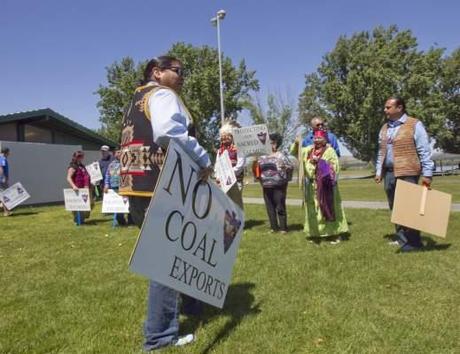
BOARDMAN, Ore. - In the bright spring sunshine, Patrick Luke cast his gill nets at one of his usual Columbia River spots, hoping to catch some spring chinook headed upstream.
But on Tuesday, Luke, an enrolled member of the Yakama tribe from White Swan, did not fish alone. Flying the Yakama Nation flag, his boat carried several tribal leaders and branches of wild rose, a symbolic gesture for protection of the river.
That's because Luke fishes along the river in the area where a coal company is planning to develop a rail-to-barge transfer terminal for coal.
The Yakamas oppose the development because they say it would destroy fishing sites. More broadly, they are concerned about the environmental impacts of increased coal traffic in the Columbia Gorge.
Ambre Energy, the Australia-based coal company behind the project, claims the facility - which would be constructed in an industrial zone at the Port of Morrow - will have no impact on tribal fishing sites and poses minimal risk to the environment.
By fishing Tuesday, the Yakama intended to demonstrate otherwise.
Before heading out on the boat, Tribal Council Chairman JoDe Goudy told a gathered crowd of nearly 100 at Boardman Marina that Ambre Energy's proposal to ship 8 million tons of coal annually down the Columbia for export to Asia would make money for a few at the expense of the water, the salmon and future generations of native people.
"Today, we make a stand against all those who will fight for the mighty dollar and against the indigenous people of this land," Goudy said.
It was one of the first high-profile events for Goudy, who was elected chairman of the Tribal Council last month, replacing Harry Smiskin. Goudy was joined in voicing his opposition to the plan by several other Yakama leaders and a leader of the Lummi Nation from northwest Washington.
The Lummi Nation is an outspoken opponent of another proposed coal export terminal at Cherry Point along the coast of Whatcom County, which would also be located in an area used by tribal fishers.
Lummi Councilman Jay Julius said that he believed the Army Corps of Engineers has a responsibility to stop the coal export projects in the Northwest because they violate the tribes' treaties protecting fishing rights.
"The Lummi Nation stands with the Yakamas," Julius said. "I ask the Army Corps of Engineers to uphold the Constitution and protect our treaty rights."
The proposed project, known as the Morrow Pacific Project, is in the process of securing state and federal permits. The Oregon Department of Environmental Quality already has approved the project's air quality and construction permits, but another permit from the Department of State Lands is still under consideration.
Oregon Gov. John Kitzhaber stated his opposition to the project last month and set a May 31 deadline for the state agency that is responsible for making the permit decision.
As part of the Department of State Lands' process, Ambre Energy on May 1 submitted documents claiming that no tribal fishing sites were in jeopardy. Although the Yakama Nation submitted a letter to the state saying that tribal members do fish in the area, a spokeswoman for the company said it disputes the tribe's claim after having a expert review the map of registered sites.
"They have incorrectly identified a tribal fishing site at the dock location," spokeswoman Liz Fuller said.
Ambre Energy also submitted reports from dock workers and boat operators that they had not seen fishing in the area.
However, the Yakamas maintain that their treaty protects fishing rights along entire stretch of the Columbia, not just at registered sites and regardless of recent use.
"Our people have fished here since time immemorial," Goudy said, adding that the tribe is not just concerned with impact at the specific site, but more importantly the risks that coal pollution presents for the entire river.
Fuller said Ambre Energy was in a consultation process with the four Columbia River tribes - the Yakamas, Nez Perce, Warm Springs, and Umatilla - as part of the federal permitting, and she hoped the company could work out potential issues with the tribes there instead of through the state of Oregon's permit process.
She added that the project was designed from start to finish to have minimal environmental impact.
"We cover the barges to mitigate dust and the storage and transfer points are all enclosed," Fuller said. "Lots of stuff goes up and down the river in barges already, and there's a strong safety record. So we felt that was the best of mode transport for the coal."
But George Selam, the chairman of the Yakamas' General Council, said he had a hard time believing that Ambre Energy could ship millions of tons of coal every year without any environmental impact.
"Bottom line, what if something happened to the barge? It could be like the Gulf oil spill," Selam said as he watched the river flow past.
Plus, he added, burning the coal in China has environmental impacts as well, even if they are less direct than the threat he sees to the river, and to the native people who depend on it.
"We are river people," Selam said. "Our lands have no price tag. Once our resources are gone, we're gone."

